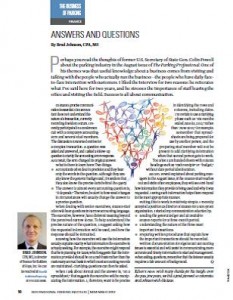Perhaps you read the thoughts of former U.S. Secretary of State Gen. Colin Powell about the parking industry in the August issue of The Parking Professional. One of his themes was that useful knowledge about a business comes from visiting and talking with the people who actually run the business—the people who have daily face-to-face interaction with customers. I liked the interview for two reasons: he reiterates what I’ve said here for two years, and he stresses the importance of staff leaving the office and visiting the field. Success is all about communication.
In finance, precise communication is essential. If an accountant does not understand the nature of a transaction, correctly recording it seldom occurs. I recently participated in a conference call with a company’s accounting firm and several staff members. The discussion concerned entries for a complex transaction. A question was asked and answered, and I asked a follow-up question to clarify the accounting firm’s response. As a result, the firm changed its original answer.
What is there to learn here? Two things:
Accountants often deal in precision and they hear only the words in the question. Although they usually know the general background, it’s seldom that they also know the precise facts behind the query.
The answer to almost every accounting question is, “it depends.” Therefore, be alert to how small changes in circumstances will usually change the answer to a precise question.
When dealing with senior executives, finance staff often will hear questions in narrow accounting language. The executive, however, has a different meaning beyond the perceived narrow focus. To help understand the precise nature of the question, I suggest asking how the requested information will be used, and how the response should be formatted.
Knowing how the executive will use the information usually explains exactly what information the executive is actually seeking. For example, the executive might respond that he is planning for taxes, which suggests that the information provided should be on a cash basis rather than the customary accrual basis in which most accounting records are maintained. Clarifying questions can then be asked.
When I ask about format and the answer is, “on a spreadsheet,” that suggests the executive will be manipulating the information. I, therefore, want to be precise in identifying the rows and columns, including dates. I’m certain to use a clarifying phase such as “six months ended June 30, 2012,” rather than “June 2012,” for example.
Remember that spreadsheets are being prepared for use by another person, and the preparing staff member will not be present to add clarifying information when that second person gets to work. Too often I am handed sheets with column headings such as “cash receipts” or “budget,” without date period identification.
As Gen. Powell explained about parking managers in the August issue, if the finance staff reaches out and visits other employees, they will see first-hand how information they provide is being used and why it was requested. Having such information helps them respond in the most appropriate manner.
Putting this to work is relatively simple. I recently accepted a position as director of finance for a non-profit organization. I started my communication eduction by:
Reading the general ledger and all available finance reports for a three-month period.
Understanding the nature of the three most important transactions.
Preparing written procedures that explain how the important transactions should be recorded.
Written documentation for significant accounting issues is essential and will assist in communicating more accurate and timely information to staff and management. When asking questions, remember that the listener usually requires a fair amount of background.
Editor’s Note: With many thanks for his insight over the past few years, we bid a fond farewell to columnist Brad Johnson with this issue.
Brad Johnson, CPA, MS, is director of finance for Builders of Hope, Inc. He can be reached at Brad@buildersofhope.org or 919.830.6666.
TPP-2012-11-Answers and Questions

